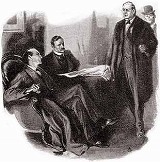“Very good. The case is definite enough. The man, dead or alive, either fell or was precipitated from a train. So much is clear to me. Continue.”
“The trains which traverse the lines of rail beside which the body was found are those which run from west to east, some being purely Metropolitan, and some from Willesden and outlying junctions. It can be stated for certain that this young man, when he met his death, was travelling in this direction at some late hour of the night, but at what point he entered the train it is impossible to state.”
“His ticket, of course, would show that.”
“There was no ticket in his pockets.”
“No ticket! Dear me, Watson, this is really very singular. According to my experience it is not possible to reach the platform of a Metropolitan train without exhibiting one’s ticket. Presumably, then, the young man had one. Was it taken from him in order to conceal the station from which he came? It is possible. Or did he drop it in the carriage? That also is possible. But the point is of curious interest. I understand that there was no sign of robbery?”
“Apparently not. There is a list here of his possessions. His purse contained two pounds fifteen. He had also a check-book on the Woolwich branch of the Capital and Counties Bank. Through this his identity was established. There were also two dress-circle tickets for the Woolwich Theatre, dated for that very evening. Also a small packet of technical papers.”
Holmes gave an exclamation of satisfaction.
“There we have it at last, Watson! British government - Woolwich. Arsenal - technical papers - Brother Mycroft, the chain is complete. But here he comes, if I am not mistaken, to speak for himself.”

A moment later the tall and portly form of Mycroft Holmes was ushered into the room. Heavily built and massive, there was a suggestion of uncouth physical inertia in the figure, but above this unwieldy frame there was perched a head so masterful in its brow, so alert in its steel-gray, deep-set eyes, so firm in its lips, and so subtle in its play of expression, that after the first glance one forgot the gross body and remembered only the dominant mind.
At his heels came our old friend Lestrade, of Scotland Yard - thin and austere. The gravity of both their faces foretold some weighty quest. The detective shook hands without a word. Mycroft Holmes struggled out of his overcoat and subsided into an armchair.
“A most annoying business, Sherlock,” said he. “I extremely dislike altering my habits, but the powers that be would take no denial. In the present state of Siam it is most awkward that I should be away from the office. But it is a real crisis. I have never seen the Prime Minister so upset. As to the Admiralty - it is buzzing like an overturned bee-hive. Have you read up the case?”
“We have just done so. What were the technical papers?”
“Ah, there’s the point! Fortunately, it has not come out. The press would be furious if it did. The papers which this wretched youth had in his pocket were the plans of the Bruce-Partington submarine.”
Mycroft Holmes spoke with a solemnity which showed his sense of the importance of the subject. His brother and I sat expectant.
“Surely you have heard of it? I thought everyone had heard of it.”
“Only as a name.”